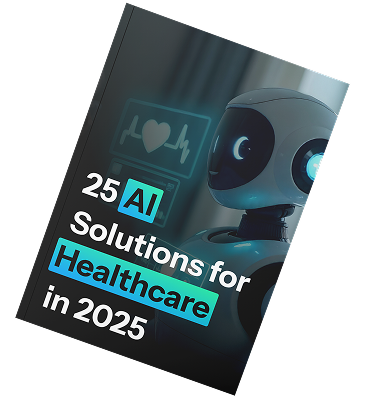AI in Dentistry: Role, Advantages, and Challenges in 2025
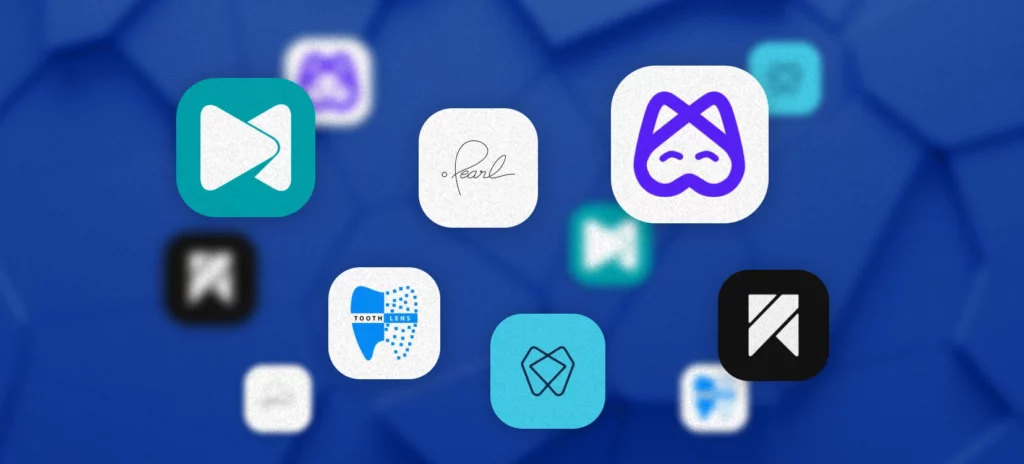
As we head into 2025, AI is changing dentistry and is already used in around 30-35% of US and European dental practices, according to Dental Products Report and ADA research reports.
And the waves are rising fast. One in three dentists now use AI in diagnostics, personalized treatment planning, patient education, or automation of administrative tasks.
Specialized fields like orthodontics and radiology are leading the way. Almost half of orthodontists are using AI-driven aligners and remote patient monitoring.
In this blog post, we’re diving deep into:
- How AI is transforming dentistry
- The key benefits and challenges of integrating AI into dental practices
- Practical ways dental professionals can harness AI-powered dental applications, including Pearl, Overjet, DentalMonitoring, and ToothLens, for greater efficiency and patient care
- Exciting predictions for the future of AI-driven dental healthcare
- How Riseapps can help with optimizing and development of AI-driven healthcare and telemedicine apps.
What is the Role of Artificial Intelligence in Dentistry?
AI changes the game in dentistry by detecting and diagnosing early widespread conditions like caries and periodontal disease.
From a dental perspective, AI can be broken down into:
- diagnosis,
- clinical decision making,
- treatment planning,
- treatment outcome prediction, etc.
Diagnosis AI is the most used AI application in dentistry. It allows for more accurate and faster detection of dental conditions and better resource allocation, taking the dentist’s workload off.
AI Implementation in Dentistry: Advantages and Challenges
AI is no longer sci-fi. It’s happening in dentistry today. By increasing accuracy, simplifying tasks, and improving patient interaction, AI brings huge advantages for dentists and patients.
Below, we mention the most common benefits of using AI in dentistry.
10 Advantages of Using AI in Dentistry
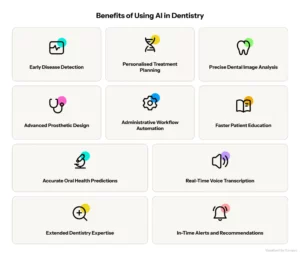
Personalised Treatment Planning
One of the significant changes with AI in dentistry is the shift to patient-centered care. AI algorithms help analyze vast amounts of patient data like:
- medical history,
- genetic factors,
- dental imaging,
- lifestyle and previous treatment outcomes.
Drawing an analogy, a similar patient-centered approach can be seen in the AI-driven healthcare app built by Riseapps, which analyses patient-specific data to create individualized care management plans.
Similarly, AI recommendations in dentistry allow dentists to deliver interventions that match patient needs, maximizing treatment success and patient satisfaction.
Early Disease Detection
AI is brilliant at detecting dental pathologies at very early stages before the human eye can see them. From initial caries development to incipient periodontal disease or early-stage oral cancer, algorithms rapidly scan images like:
- X-rays,
- CBCT scans,
- intraoral photos, etc.
This early detection means rapid intervention, no disease progression, and no need for more invasive future treatments, preserving oral health and improving treatment outcomes.
Precise Dental Image Analysis
AI with dental imaging has revolutionized diagnostic accuracy. Deep learning systems process and analyze complex dental imaging in seconds, finding abnormalities that would be missed by the human eye, like minor cavities or subtle bone loss.
AI-powered solutions like Pearl or Overjet interpret radiographs in seconds, giving dentists accurate and reliable clinical insights that boost their diagnostic confidence.
In-Time Alerts and Recommendations
AI proactively diagnoses and alerts dentists to risk factors indicated by the patient’s specific clinical data. Automated in-time AI notifications prompt dentists to schedule interventions, preventive procedures, or patient follow-ups.
These evidence-based recommendations foster preventive dentistry and patient health.
Good communication and patient engagement lead to better treatment outcomes. AI features like chatbot assistants (e.g., Amina by Black Doctor) show the power of responsive and interactive patient communication.
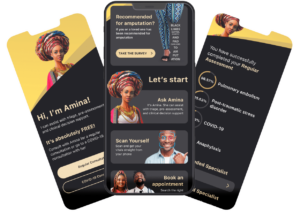
In dentistry, similar AI chatbots book appointments, answer dental health FAQs, remind patients of check-ups, and provide aftercare instructions.
These tools support patients outside the dental chair, increasing patient satisfaction and compliance.
Administrative Workflow Automation
AI automation simplifies dental clinic management greatly, allowing administrators to easily handle routine tasks like appointment bookings, follow-ups, billing, and record-keeping.
For example, PareIT’s AI medical summarization software developed by Riseapps shows how medical documentation can be summarized 40x faster than traditional methods.
Implementing similar solutions in dental practices saves a lot of time, reduces errors, and allows staff to focus more on patient care.
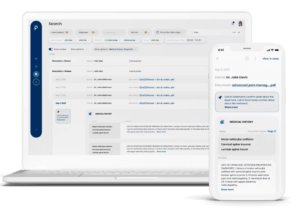
Faster Patient Education
AI educates patients through interactive and visual experiences. Using AI-powered visualizations and augmented reality demonstrations (e.g., ToothLens), patients can see predicted treatment results or visualize disease progression if left untreated.
This increased understanding empowers patients and gets them involved in their oral health.
Accurate Oral Health Predictions
Predictive analytics powered by AI predicts individual risks and trends in oral health conditions. AI can predict the risk of future oral health issues by analyzing historical data, genetics, and environmental factors.
Dentists then initiate early interventions or preventive measures, improving patient’s long-term oral health and reducing the likelihood and severity of future disease complications.
Real-time Voice Transcription
Dentists face enormous note-taking and documentation challenges, which impact productivity and patient interaction time.
Using AI voice transcription technology, similar to one Riseapps created for one healthcare provider, dental professionals can automate clinical notes and dictate patient instructions and treatment plans during consultations.
It means accurate, instant documentation, freeing time to focus on patient care, communication, and clinical activities.
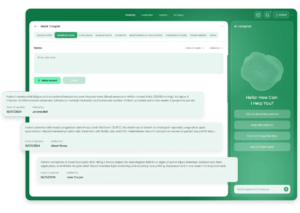
Advanced Prosthetic Design
AI brings prosthodontic precision and customization to a whole new level with digital design and production. AI-powered CAD/CAM systems are similar to advanced AI systems, which integrate patient-specific data during treatment planning.
AI dental systems design and produce customized prosthetics that match patients’ preferences, aesthetic goals, functional needs, and anthropological measurements, maximizing the comfort, fit, and lifespan of:
- crowns,
- bridges,
- dentures,
- implants.
Extended Dentistry Expertise
AI-powered teledentistry extends dentists’ capabilities beyond the office walls, connecting specialists and patients regardless of geographical barriers.
Advanced AI algorithms support remote patient monitoring, precise diagnostics, and consultative evaluations, ensuring high-quality dental expertise everywhere.
AI, therefore, increases oral healthcare access and quality globally. AI in dentistry delivers better patient outcomes, more clinical efficiency, and a higher standard of care.
Common Challenges of AI Implementation in Dentistry
As AI moves into dental healthcare, several challenges, regulatory frameworks, and ethical considerations arise.
Getting AI into dental practices requires careful attention to patient privacy, algorithm integrity, and workflow compatibility.
Data Security and Privacy
Patient data is sacrosanct in dentistry, especially with AI applications that handle extensive personal, clinical, and imaging data.
Dental AI solutions must comply with strict data protection regulations like HIPAA in the US and GDPR in the EU.
To maintain patient trust and regulatory compliance, dental AI systems must have robust security measures:
- data encryption,
- secure cloud storage,
- multi-factor authentication,
- strictly managed access controls.
An example of a HIPAA-compliant mental health platform is Riseapps’ BrainMD+ project.
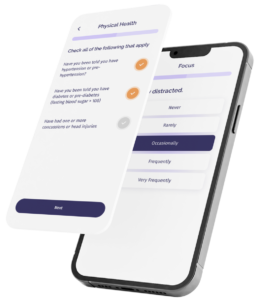
This project showcases how Riseapps can ensure secure management of sensitive patient data for its clients, providing dentists with timely patient history and dental records while maintaining appropriate levels of confidentiality.
Bias in Dental AI Algorithms
AI algorithms in dentistry are accurate because of the quality and diversity of their training data. Suppose bias is introduced into this data (e.g., by training systems on one demographic or geographic population group).
In that case, results will inadvertently discriminate against other patient groups, causing disparities in diagnosis, treatment, and care.
Dental AI developers must prioritize fairness and inclusivity by using diverse, representative datasets and continuously auditing their AI algorithms for biases.
Regular evaluation and algorithm optimization are needed to provide equal, high-quality oral care to every patient, regardless of age, gender, ethnicity, or socio-economic background.
Integration into Existing Dental Systems
AI solutions in dentistry must integrate with existing practice management and electronic dental record systems, which often have legacy software and segmented data.
Complex integrations, incompatible formats, data silos, and workflow disruptions can be real-world issues.
Successful AI implementation in dentistry requires collaboration between AI developers, dental professionals, and practice managers to streamline existing workflows rather than disrupt them.
AI solutions should enhance the capabilities of current dental management systems, be user-friendly, and minimally disrupt daily clinical routines.
Medical Device and Software Regulations
AI solutions that support diagnosis, clinical decision-making, or treatment planning fall into the “medical device” category.
Regulatory bodies like the FDA (US) and the European Medicines Agency (Europe) require such AI software to meet strict safety, reliability, and clinical validity guidelines before they can be used widely.
Dental AI developers should work with regulatory authorities, professionals, and clinical researchers to validate their products, comply fully with device regulations, and ensure their AI solutions are safe, clinically effective, and reliable to gain professional acceptance and patient trust.
Standards for AI Algorithm Transparency
Dental professionals’ trust in AI technology depends greatly on transparency and interpretability, especially for critical tasks like disease diagnosis, risk assessment, or automated treatment recommendations.
Dental professionals will not trust AI-driven decision-making without clear standards and transparency guidelines.
Providers and regulators must clearly outline transparency standards for AI in dentistry to gain dentists’ trust and confidence.
AI tools’ algorithms must be interpretable, and sufficient information must be provided so dental professionals can verify the accuracy and logic behind any AI-generated inference or recommendation.
How is AI Used in Dentistry? AI Application Use Cases
AI in Operative Dentistry
AI algorithms assist in automatically detecting early dental caries from radiographs and clinical images, often matching or surpassing the diagnostic accuracy of experienced dentists.
AI in Cariology (Dental Caries Detection)
AI models trained on dental images significantly boost early caries detection, often surpassing human dentists.
AI algorithms effectively identify dental caries with high accuracy, sensitivity, and specificity, improving clinical decision-making and preventive dental care.
Machine learning algorithms achieved accuracy rates between 82% and 99.2% using periapical radiographs and 87.6% and 95.4% using bitewing radiographs, dramatically improving early caries diagnosis capabilities.
For example, Pearl’s Second Opinion has emerged as the first live dental AI platform with FDA clearance.
The platform checks multiple conditions in dental X-rays and works as a “second set of eyes.” Dentists use it to identify pathologies such as:
- bone levels,
- calculus,
- caries,
- impaction,
- margin discrepancy,
- periapical radiolucency,
- widened periodontal ligament.
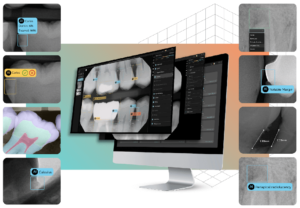
Tests show that dental professionals who use Second Opinion AI detect pathologies with 37% more accuracy than traditional methods.
The system uses color coding that makes patient education more effective. Light pink shows early caries within enamel, while darker magenta shows caries that extend into dentin.
Let’s have another example. VideaHealth’s AI dental solution helps practices deliver more accurate, patient-centric care by improving diagnostics, building trust, and speeding up practice efficiency.
Its advanced FDA-cleared algorithms detect hard-to-see issues across restorative, periodontic, and endodontic conditions, so you can detect disease earlier and explain treatment clearly.
Clinicians using VideaHealth’s AI see 119% more caries detection, 13% higher case acceptance, $80k more revenue annually, and higher patient engagement.
Trusted by large dental groups, VideaHealth simplifies workflows and empowers dental professionals to deliver better data-driven care daily.
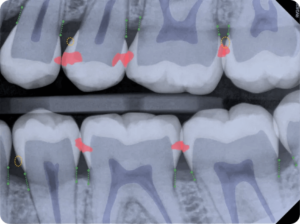
The system’s accuracy comes from validation by more than 100 clinical experts who added millions of annotations to train AI algorithms. This extensive dataset helps identify subtle disease patterns in various patient populations.
How Risapps Can Help with AI Implementation in Cariology
Risapps can help dentists build advanced AI-driven caries detection and periodontal diagnostic tools like VideaHealth and Pearl.
We can also enhance them with AI-driven treatment plans for individual dental patients that can be more precise by taking into account:
- patient-specific dental history,
- risk factors,
- lifestyle data,
- real-time diagnostic inputs.
Risapps can integrate HIPAA-compliant, self-hosted telemedicine and eSignature solutions with your dental software reducing operational costs compared to expensive third-party subscriptions.
Live dental consultation sessions combined with AI-enhanced X-ray diagnostics and virtual assessments will become cost-effective and scalable, increasing access to quality dental care across more practices.
AI in Endodontics (Root Canal Treatments)
AI enhances endodontic diagnostics by identifying pulpitis, periapical lesions, and complex C-shaped canals with impressive accuracy (86%-94%), improving early diagnosis accuracy and treatment outcomes.
Automated systems using AI algorithms accurately determine root canal working lengths (up to 93% accuracy), significantly enhancing the reliability and success of root canal therapies.
For example, Planmeca’s AI-powered dental solutions optimize clinical workflows and enhance diagnostic accuracy through advanced automation and precision.
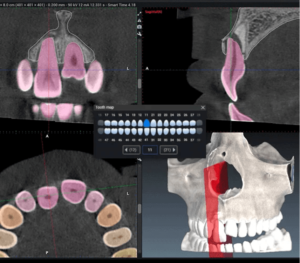
The Romexis Smart® feature streamlines CBCT image processing by automatically:
- segmenting anatomical structures,
- locating mandibular nerve canals,
- aligning intraoral scans,
- offering tooth-centered navigation.
Additional AI enhancements support orthodontic simulations, automated smile designs, noise suppression for endodontic imaging, and precise patient movement correction, empowering dental practices to deliver superior patient outcomes efficiently.
How Risapps Can Help with AI Implementation in Endodontics
Risapps can build AI-powered dental software like Planmedica and implement dashboards integrating:
- dental treatment plans,
- scheduled procedures,
- daily hygiene tasks,
- long-term dentistry goals.
The integrated chat interface ensures high patient engagement, treatment adherence, and visibility of progress toward dental health goals.
Also, Risapps can connect dentists and patients to insurance approvals, verify eligibility for dental treatments faster, and aggregate community dental health resources.
AI in Periodontics
AI allows for the automatic detection and classification of periodontal bone loss (PBL) and disease severity accurately from panoramic radiographs and clinical data.
AI-driven diagnostics can ensure timely interventions to prevent severe periodontal outcomes, including tooth loss.
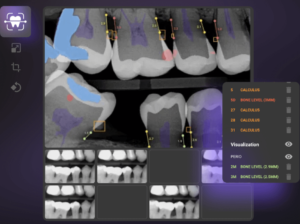
Overjet earned FDA 510(k) clearance to measure mesial and distal bone levels in radiographs for periodontal disease diagnosis.
Clinical performance tests showed Overjet’s AI measurements closely matched skilled dentists’ readings, with just a 0.3mm average difference.
This technology has transformed clinical practice. Data reveals all dentists find caries more accurately with Overjet’s AI system.
Practices using this technology report a 25% increase in case acceptance rates because patients understand their oral health better through visual AI assistance.
The system has optimized insurance claims processing. Decisions come 5x faster, and administrative work has dropped by 90%. These improvements boost practice profits while patients receive care sooner.
How Risapps Can Help with AI Implementation in Periodontics
Our team can enhance your dental software with AI-based alerts for:
- preventive dental care,
- appointment reminders,
- follow-up requirements,
- emerging dental health risks.
Real-time alerts can increase proactive treatment and efficiency and reduce emergency dental visits.
AI in Orthodontic
AI helps with the diagnosis and classification of malocclusions through sophisticated analysis of cephalometric radiographs, 3D modeling, and automated bracket placement, promoting better planning and personalized orthodontic care.
Deep learning methods aid in orthodontic image classification, cephalometric analysis, and treatment outcome predictions with superior accuracy (up to 99.4%).
AI provides simulations of orthodontic outcomes, digital impression modeling, and treatment monitoring, enhancing patient communication, trust, and satisfaction.
DentalMonitoring has emerged as the orthodontic industry’s first AI-powered Software as a Medical Device. The platform received FDA De Novo approval and MDR certification.
Practitioners can track over 60 parameters through weekly patient scans, and medical device regulations have cleared 21 specific parameters.
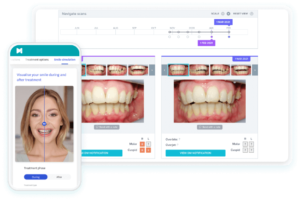
The system shows remarkable clinical capabilities. It monitors everything from aligner seats to bracket debonding using patient smartphone photos analyzed by proprietary AI.
A detailed clinical study with 2,650 patients across 29 North American sites produced over 13,000 clinical results, which confirmed the system’s safety and effectiveness.
Dental practices using DentalMonitoring need fewer in-office visits while delivering better treatment quality. The technology makes shared care delivery match patient needs.
The new SmartSTL feature lets orthodontists get updated STL files remotely without bringing patients to the office.
Another solution, Diagnocat offers advanced, AI-powered imaging analysis for both 2D and 3D dental images, streamlining diagnostics and enhancing patient care.
With automated and precise detection of over 60 dental pathologies, Diagnocat provides detailed visual reports, improves clinical accuracy, and simplifies patient communication through patient-friendly visualizations.
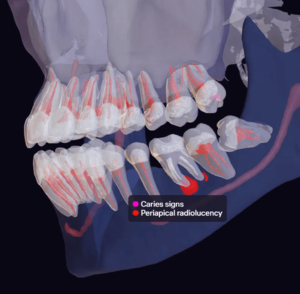
Its versatile capabilities, including automated segmentation of CBCT scans into STL models, web-based image viewing, and secure patient information sharing, make it especially beneficial for individual dentists, dental clinics, and laboratories alike.
How Risapps Can Help with AI Implementation in Orthodontic
Risapps can help dental practices reduce documentation burden, appointment coordination complexity, and manual entry errors.
Crucial in pathology automated workflows can manage biopsy commissions, results notifications and reminder systems for lesion follow-ups or disease monitoring.
Prosthodontics workflows can auto-generate prescriptions, reminders for denture adjustments, materials orders, and lab communication.
We can also build secure, centralized patient portals and dashboards for dentists, where they can manage patient-specific prostheses tracking, CAD/CAM designs, patient digital records, and ongoing denture adjustments.
AI in Oral and Maxillofacial Surgery
Oral cancer detection through image analysis (radiographs, biopsies, microscopic images) significantly improves with AI, providing pathologists with timely and accurate diagnostic assistance.
ToothLens offers advanced AI-powered dental solutions, enabling real-time remote assessments of patient-submitted dental images for early issue detection.
Its seamless integration into existing practice workflows helps dental professionals streamline appointments, enhance patient engagement, and lower costs by proactively identifying dental problems before they escalate.
AI helps diagnose and classify malocclusions through sophisticated analysis of cephalometric radiographs, 3D modeling, and automated bracket placement, promoting better planning and personalized orthodontic care.
How Risapps Can Help with AI Implementation in Oral Pathology
Risapps can build dental-specific virtual assistants and AI chatbots like Black Doctor’s “Amina” to assess dental symptoms, guide preliminary diagnosis, and automate patient responses to frequently asked questions.
For pathology, AI systems trained on lesion images and symptoms can quickly identify severe conditions and alert specialists to priority cases.
AI in Pediatric Dentistry
AI transforms pediatric dentistry by accurately spotting cavities early, making dental visits easier and friendlier for kids.
With smart imaging diagnostics and predictive analytics, it streamlines preventive care, guides orthodontic treatments, reduces invasive procedures, and uses interactive technology to teach children and parents about oral health, ensuring brighter smiles from the start.
The Videa Dental AI (VDA) became the first pediatric dental AI system cleared for patients aged 3 years and older.
This cloud-based technology spots various conditions, including caries, periapical radiolucency, calculus, furcation, and widened periodontal ligament.
How Risapps Can Help with AI Implementation in Pediatric Dentistry
Risapps can enhance activity customization and comfort management with AI so you can offer dental experiences tailored to each child patient.
Together, we can develop solutions to personalize dentist visits through sensory personalization, calming music integration, child-friendly educational videos explaining procedures, adjusting the environment for sensitive/anxious kids, and personalized sedation recommendations based on anxiety AI-data modeling.
Or Risapps can help you create intelligent virtual dental health assistants using AI to motivate, educate, and guide young patients in real time about brushing techniques, sugar intake, flossing habits, and preventive oral care.
Ready-Made vs. Custom AI in Dentistry: Which One is Right for Your Practice
Dentists have two options when bringing AI into dental practices: a ready-made, off-the-shelf AI product or a custom-built AI solution tailored to their practice’s needs.
Both have pros and cons, so the choice depends on the individual practice’s goals and operational specifics.
Ready-Made AI Dental Solutions
Ready-made AI dental platforms offer pre-built products that can be rolled out quickly, perfect for practices looking to modernize their workflow fast.
These solutions, like existing AI-powered X-ray analysis or automated patient communication tools, are quick to implement, have predictable costs, and are easy to use for standardized processes.
However, standardized solutions may not be flexible. A practice may need to make significant changes to workflows or processes to fit pre-defined capabilities, which can create limitations and reduce operational efficiency.
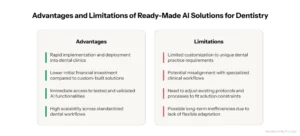
Advantages:
- Rapid implementation and deployment into dental clinics,
- Lower initial financial investment compared to custom-built solutions,
- Immediate access to tested and validated AI functionalities,
- High scalability across standardized dental workflows.
Limitations:
- Limited customization to unique dental practice requirements,
- Potential misalignment with specialized clinical workflows,
- Need to adjust existing protocols and processes to fit solution constraints,
- Possible long-term inefficiencies due to lack of flexible adaptation.
Custom-Built AI Dental Solutions
Custom AI solutions in dentistry provide software architecture designed to fit a practice’s clinical workflows and administrative needs.
Practices can address specific use cases and data requirements and integrate AI into existing IT systems, patient records management, and imaging software.
While this approach requires more initial resources, it provides long-term benefits. Customized AI software grows and evolves with the practice, adapting functionality to the changing needs of dentists, dental specialists, and their patients.
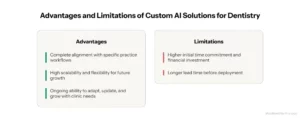
Advantages:
- Complete alignment with specific practice workflows,
- High scalability and flexibility for future growth,
- Ongoing ability to adapt, update, and grow with clinic needs.
Limitations:
- Higher initial time commitment and financial investment,
- Longer lead time before deployment.
At Riseapps, our AI development team can help dental practices explore ready-made and fully customized AI solutions.
With experience in implementing flexible, compliant, and bespoke dental AI tools, Riseapps can help dentists determine the best AI integration strategy – so your practice gets the most out of this revolutionary technology.
Our team can create AI solutions tailored to healthcare organizations’ unique vision and needs so you can seamlessly improve clinical precision and operational performance.
What’s the Future of Dentistry with AI?
Artificial Intelligence is changing dentistry fast, from how we diagnose conditions to how we plan, perform, and monitor treatments. Let’s look at six areas where AI will revolutionize dentistry shortly:
1. Early and Better Diagnosis of Oral Health Conditions
AI allows dentists to detect cavities, periodontal (gum) diseases, oral cancers and even unseen developmental anomalies in their earliest stages.
By analyzing large amounts of radiographs, intraoral scans and patient records, AI algorithms can highlight subtle signs that would otherwise be missed, so we can intervene earlier, prevent further complications and optimize patient health in the long term.
Plus, AI can pinpoint exact lesion location and severity, making treatments more accurate and less invasive, resulting in better patient comfort and outcomes.
2. Personalised Oral Care Plans based on Genetic Information
AI can create custom oral health plans through predictive analytics by assessing each patient’s genetic profile, lifestyle, and risk factors. Integrating patient-specific data such as oral microbiome conditions, predisposition to dental diseases, health background, dietary habits, and lifestyle factors will become the norm.
Personalized recommendations for preventive care, such as dietary advice, ideal dental hygiene routines, and targeted follow-up schedules, will become the norm.
In the near future, AI-powered genetic insights will significantly reduce dental disorders, enabling true preventive dentistry based on patient biology and behavioural patterns.
3. Robotic Assistance for Precision Dental Surgeries
Dental implants, complex oral surgeries, and orthodontic interventions will increasingly use AI-powered robots.
With robotic help, dentists can perform surgeries faster, safer, and more precisely. Robots eliminate human error, better navigate delicate anatomical structures, reduce operative time, and improve patient recovery.
AI-powered robots will be game changing for complex procedures, achieving previously unattainable standards in safety, speed and precision.
4. Better Prosthodontics with AI-Coupled CAD/CAM Systems
In prosthodontics and orthodontics, AI combined with CAD/CAM will streamline the design and fabrication of custom dental appliances.
Intelligent algorithms will analyze patient data and anatomical information in real-time and optimize prosthetic designs (crowns, implants, dentures, bridges, aligners) with unprecedented precision and speed.
This level of patient-specific design will improve clinical outcomes, patient aesthetics, and overall prosthetic longevity and function.
5. More Dental Access through AI-Based Teledentistry
AI-powered teledentistry will bring specialist care to remote or under-served areas. Real-time AI diagnostic tools combined with remote monitoring platforms will allow dental professionals to assess, diagnose, and plan treatment from afar.
These AI systems will also flag anomalies between appointments so continuous and accessible dental care can be delivered wherever patients are.
It will mean better oral health and prevention in remote or under-resourced areas.
6. Standardised Protocols and Transparent AI
For widespread AI adoption, compatibility and transparency are key. Standardised global protocols will enable secure interoperability between dental software and clinics worldwide, data sharing, seamless communication and consistent diagnostics.
Explainable AI tools that give full transparency on diagnostic results will build clinical trust by allowing dentists to understand and trust AI recommendations.
Ultimately, these standards and transparency will allow dentists and patients to trust and rely on AI and change oral healthcare globally.
Why Choose Custom AI Solutions by Riseapps?
- Seamless Integration: Our AI systems fit like puzzle pieces with your existing technology, such as electronic health records (EHRs) and telemedicine platforms, creating a frictionless workflow.
- Smart Growth: Built to grow with your organization, our custom AI solutions adapt to increasing demands, technological advancements, and expanding patient needs, turning today’s investments into tomorrow’s opportunities.
- Total Flexibility: Whether you need precise diagnostics, streamlined resource management, or advanced patient monitoring, Riseapps engineers custom AI solutions to solve your organization’s biggest challenges.
- Unbeatable Security and Compliance: Each AI solution we develop follows strict compliance and industry standards like HIPAA and GDPR and safeguards your patient data with multiple layers of security.
- Long-term Partnership: Our commitment goes beyond delivering the product. We’re with you post-implementation with hands-on support to ensure your AI systems run at peak performance as your clinical landscape evolves.
Extensive expertise in delivering AI services
- Proven results: With over 200 ROI-positive solutions delivered, we have helped businesses exploit AI to optimize operations, streamline customer service, and improve user engagement.
- Advanced AI technologies: Our teams utilize machine learning, NLP, and computer vision to offer solutions like AI chatbots, virtual assistants, and AI-powered health monitoring systems.
- Customization and flexibility: Riseapps’ teams tailor AI services to meet unique business needs, whether it’s developing a proof of concept (PoC), MVP, or full-scale AI solution.
- Recognized expertise: Our 30+ clients from healthcare trust Riseapps’ extensive AI consulting and development capabilities.
With Riseapps, you’re not just getting technology. You’re investing in an AI partner for your long-term success.
FAQ
How many dental practices use AI?
As of 2024 35% of dental practices have implemented AI into their practice. This includes diagnostic imaging, treatment planning and administrative tasks. The AI dental imaging market which is a big part of this trend is valued at $417.5 million as of 2024 and is expected to reach $3.83 billion by 2031 with a CAGR of 32.5%.
How is AI used in dental education?
Artificial intelligence (AI) is being increasingly incorporated into dental education to enhance learning and prepare students for the technologically advanced clinical environment. Here are some key applications: personalized learning & curriculum support with adaptive learning platforms and generative AI tools, virtual patient simulations, AI-powered assessment tools, and radiographic interpretation.
Is AI going to replace dentists?
AI helps in many areas of dentistry but can’t replicate the expertise, hands on skills and care of a human dentist. Integration of AI in dentistry is about augmenting the dentist not replacing the dentist. AI is a powerful tool in dentistry, helping professionals to deliver better more efficient care while the human touch remains at the heart of patient care.
Can AI detect tooth decay?
Yes, AI can detect tooth decay (dental caries) with high accuracy. AI systems especially those using deep learning algorithms like convolutional neural networks (CNN) can analyse dental radiographs (bitewings, panoramic X-rays) and intraoral photographs to detect early and advanced carious lesions.
How is artificial intelligence used in pediatric dentistry?
AI in pediatric dentistry enables early cavity detection, personalized risk assessment, and preventive care planning. It supports behavior management using interactive virtual reality tools, creates engaging patient education, and facilitates remote monitoring to improve children's oral health outcomes.
Contact Us



